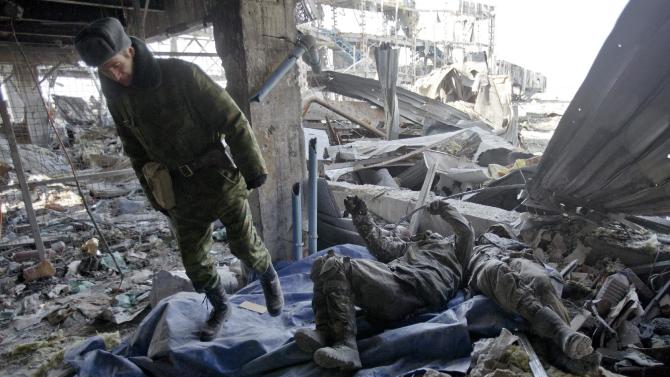Reading The Approved Script
"Only the official statistics are classified. This cannot hinder us in any way."
"It doesn't stop the families of the dead and wounded from seeking us out."
Valentina Melnikova, head, Union of Soldiers' Mothers' Committees
"This...should be seen as a threat to activists, politicians and journalists who deal with this."
"This shows that the war with Ukraine - undeclared but ongoing - is a major sore spot for Putin."
Ilya Yashin, close aide to former opposition leader Boris Nemtsov

Nonsense, all of it, since we have the solemn word of an honourable man, the champion of Russian bears, that the conflict in Ukraine has nothing to do with Russia; it is a disagreement between a fascist Ukrainian government and a noble handful of pro-Russian Ukrainians for whom the Kremlin has a special place in their compassionate hearts.
Logically enough, it follows that Vladimir Putin, wishing to spare the anguish of Russian mothers of soldiers defending the honour of Russia, a new state secret classification removes from public view any deaths of Russian soldiers during peacetime operations. This practical move is no reflection whatever on the unwarranted and utterly worthless accusations that Mr. Putin has at any time ordered the presence of Russian troops on Ukrainian soil.
Life is full of contradictions and coincidences, it is a fact.
The new decree in amendment of a list of classified data originating pre-Putin in 1995 extends secrecy from wartime casualty counts to any that may be incurred during "peacetime special operations", and refers only to information that might emanate from official military quarters. The fear is that it may be extended to include private citizens, journalists; any other source of data, speculative or otherwise associated with military deaths.
Criminal charges for the present are to be restricted to defence ministry officials who err by disclosing casualty information, and extended to those who take that data from them. Social networks, hospitals, relatives of the deceased soldiers remain home-free for the time being. Not to say that there will be no harassment of journalists and bloggers attempting to find reality in the muck of obfuscation.
Lev Shlossberg, a local politician in the city of Pskov in northwestern Russia was beaten severely for his efforts in investigating the deaths of servicemen from the local airborne unit. The information he was attempting to put together was not classified, but it was not his to be had, quite evidently. The new decree obviously also has nothing to do with Ukraine, since Russia is nowhere in Ukraine. Crimea is no longer in Ukraine.
The civil conflict in eastern Ukraine is just that; a civil conflict in eastern Ukraine. It would be impossible to hold anyone for punishment claiming they have violated the new decree, since doing so would become an official admission that Russia is indeed busy with a "special operation" in eastern Ukraine. The official line is to be toed; nothing unusual whatever there.
The two wounded Russian servicemen from military intelligence GRU, captured in Ukraine and paraded triumphantly in front of television cameras by Ukrainian authorities were retired, according to the Russian defence ministry. That must have upset the two Russians dreadfully, since they have denied any such retirement on their part; a voluntary one, that is, while the imposed one is beyond their control.
Then there is the case of Svetlana Davydova, a Russian national charged with treason for having alerted the Ukrainian embassy to injudiciously inform them that she had overheard a soldier's conversation about troops from a nearby military base being sent to Ukraine. Well, these things happen, don't they?
Russians are a compassionate lot. They also detest the very thought that the very ideology that was responsible for the deaths of millions of innocent Russians during World War II when their former ally in the Axis turned against them, now finds a comfortable place of residence in Ukraine. Despite which, news of the deaths of Russian soldiers is dreadfully distressing. But wholly unlikely, because their president says so.

<< Home